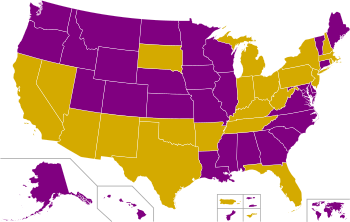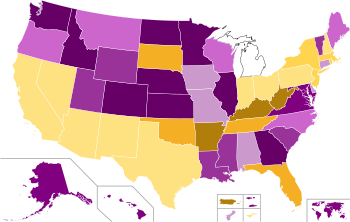| ||||||||||||||||||||||
4,233 delegates to the Democratic National Convention 2,117 (majority) votes needed to win | ||||||||||||||||||||||
|---|---|---|---|---|---|---|---|---|---|---|---|---|---|---|---|---|---|---|---|---|---|---|
| ||||||||||||||||||||||
| ||||||||||||||||||||||
| Democratic Party | |
|---|---|
| Republican Party | |
| Minor parties | |
| Related races | |
| |
| ||
|---|---|---|
|
Personal
Illinois State Senator and U.S. Senator from Illinois 44th President of the United States
Tenure
 |
||
| ||
|---|---|---|
|
First Lady of the United States
U.S. Senator from New York
U.S. Secretary of State
2008 presidential campaign 2016 presidential campaign Organizations
|
||
| ||
|---|---|---|
|
Personal U.S. Senator from Delaware 47th Vice President of the United States Vice presidential campaigns 46th President of the United States Incumbent Tenure  |
||
From January 3 to June 3, 2008, voters of the Democratic Party chose their nominee for president in the 2008 United States presidential election. Senator Barack Obama of Illinois was selected as the nominee, becoming the first African American to secure the presidential nomination of any major political party in the United States. However, due to a close race between Obama and Senator Hillary Clinton of New York, the contest remained competitive for longer than expected; neither candidate received enough pledged delegates from state primaries and caucuses to achieve a majority, without endorsements from unpledged delegates (superdelegates).
The presidential primaries actually consisted of both primary elections and caucuses, depending upon what the individual state chose. The goal of the process was to elect the majority of the 4,233 delegates to the 2008 Democratic National Convention, which was held from Monday, August 25, through Thursday, August 28, 2008, in Denver, Colorado. To secure the nomination, a candidate needed to receive at least 2,117 votes at the convention—or a simple majority of the 4,233 delegate votes. This total included half-votes from American Samoa, Guam, the United States Virgin Islands, in addition to Democrats Abroad, as well as 'superdelegates'—party leaders and elected officials who were not chosen through a primary or caucus. The race was further complicated by a controversy over the scheduling of the Michigan and Florida state primaries, which had been scheduled earlier than party rules permitted, affecting the number of delegates that those states sent to the national convention.
The popular vote tally from most news organizations did not include the states of Iowa, Maine, Nevada and Washington, as these states did not release the results of the popular vote from their caucuses. The media reports did include Florida, which neither Clinton nor Obama contested, as well as Michigan. Both states were penalized by the Democratic National Committee (DNC) for violating party rules. Michigan proved a source of controversy due to the change in the date of the primary election. Consequently, Obama and other candidates removed their names from the ballot yet Clinton did not. The DNC did not count the popular vote from Michigan, and evenly split the state's delegates between Clinton and Obama. As a result, without the Michigan vote, Obama won the popular vote; whereas with the votes from Michigan, Clinton won the popular vote.[3] Nevertheless, regardless of how votes were counted, the candidates' totals were within less than one percent of each other.[4]
Obama received enough superdelegate endorsements on June 3 to claim that he had secured the simple majority of delegates necessary to win the nomination, before Clinton conceded the nomination four days later.[5][6] Obama was nominated on the first ballot, at the August convention. He went on to win the general election, and became the 44th president of the United States on January 20, 2009. Clinton went on to serve as Obama's Secretary of State for his first term as president, and the Democratic nominee for president in 2016, losing to Donald Trump.
These primaries included the nominees for the next three elections- Obama again in 2012, Clinton in 2016, and Biden in 2020.
- ^ a b c d e f "2008 Democratic Popular Vote". RealClearPolitics. Retrieved February 15, 2020.
- ^ Coomarasamy, Jamie (June 1, 2008). "Equal split masks Obama victory". BBC News. Retrieved May 1, 2010.
- ^ "Democratic Vote Count". Real Clear Politics. January 29, 2008. Retrieved March 7, 2012.
- ^ "Clinton and the Popular Vote". FactCheck.org. June 5, 2008. Retrieved May 13, 2016.
- ^ Weisman, Jonathan; et al. (June 4, 2008). "Strategy Was Based On Winning Delegates, Not Battlegrounds". The Washington Post. Retrieved June 4, 2008.
- ^ Pickler, Nedra (May 24, 2008). "AP: Obama's Political Team Out-Organized Clinton". The Huffington Post. Huffingtonpost.com. Retrieved March 7, 2012.
Cite error: There are <ref group=lower-alpha> tags or {{efn}} templates on this page, but the references will not show without a {{reflist|group=lower-alpha}} template or {{notelist}} template (see the help page).







